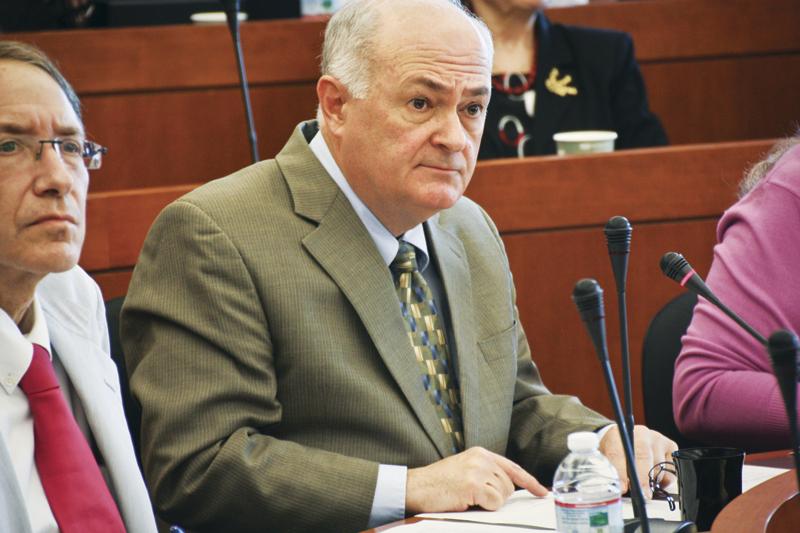With a 25,000-student population and a dense urban campus, it’s not every day that students run into University President Steven Knapp. And it’s fair to say that he runs an administration that stays mostly tight-lipped and controlled on most controversial issues.

But in a busy year, Knapp has weighed in on some big issues. Here’s a list of GW’s top leader’s most important on-the-record statements over the last year, and how they tie into his vision as a leader.
“Students come here not to party, but because they want to change the world.”
It’s an uphill battle for students and administrators to fight GW’s so-called rich kid reputation. And last April’s incriminating Washington Post story, which painted GW as a “magnet school for East Coast wealth,” only made that mountain harder to climb.
Now, we haven’t seen Knapp respond gracefully to every controversy. But in April, he admirably defended students. He pointed to GW students’ community service work across the District and their high participation rate in programs like Teach for America and the Peace Corps as examples for why, in his view, the piece was simplistic and misleading.
His response to the Washington Post’s story, which he called a “distorted characterization of our students,” was something the whole GW community could rally behind.
“To be honest with you, I haven’t been focused on that [financial] aspect of it.”
Students erupted in outrage in July when administrators announced that starting with the class of 2018, they will be required to live on campus for three years instead of two. The most feasible explanation for the policy change? With so many expensive construction projects across campus – including a new “superdorm,” slated for completion in 2016 – the $2.3 million of extra housing payments will help pad GW’s budget.
That’s why it was shocking when Knapp said the housing mandate would “strengthen the institution,” and that he hadn’t considered how it would affect GW’s bottom line.
As the University’s leader, one of Knapp’s major responsibilities is to fundraise. He’s always focused on the finances – so why wasn’t he thinking about it when he gave the green light on the housing mandate? The mandate was part of the University’s financial strategy. Was he dodging the question? Or is he just out of touch?
“When you have a complex institution with multiple schools, multiple departments, there are all kinds of disputes that can arise…You have to constantly work on trying to create the kind of atmosphere…you want in a community of scholars.”
It’s not every day that a dean is unceremoniously fired. But when Knapp’s administration laid off business school dean Doug Guthrie in August, Knapp said that arguments like these are merely par for the course for a growing university.
He has a point: With so many different schools, all allocated millions to spend each year, it’s no easy feat to get a bunch of administrators with big egos to rally around a unified vision and get things done
But students and faculty members rightly questioned whether or not getting rid of Guthrie altogether, instead of trying to compromise, was the right course of action. GW’s outreach abroad – especially in China – has been a major focus of Knapp’s tenure. And Guthrie’s firing makes everyone wonder as to whether this major goal will fall off a cliff.
“I understand how the media operates on a very short-term basis, especially now with the 24-7 news cycle and the rest of that. And every institution has to live with that.”
Ah, the classic “blame it on the media” strategy. Knapp’s administration was plagued with a PR disaster in November after the Office of Admissions admitted that they were need-aware, not need-blind.
The scandal quickly went viral, and was covered by national news organizations from to USA Today to MSNBC.
Missing from Knapp’s statement, notably, was an apology. Instead, that dirty work was left to Senior Associate Provost for Enrollment Management Laurie Koehler, who was hired this summer and had nothing to do with the decade-long lie the University is now responsible for cleaning up.
When he spoke to The Hatchet about the scandal, he argued that administrative changes at a large University create inevitable growing pains. He has a point, of course. But here’s a lesson for future administrative upheavals: Don’t blame other people for discovering your mistakes. That can’t end well.
“I think we can find a way to do it, we just needed the will to proceed with it.”
A high point for the Student Association came when Knapp announced in November his intention to move Student Health Service and the University Counseling Center to an on-campus location.
The relocation of these essential campus services is not only a victory for student leaders, but for Knapp’s administration, which demonstrated that if students come up with concrete plans for serious campus issues, leaders will listen. Knapp, however, could earn more trust from GW stakeholders if he was more transparent with the potential options for the health center’s new location. Space is a precious resource in Foggy Bottom, so Knapp should tell the community where the health centers could be relocated to push forward a constructive dialogue.
The writer, a junior majoring in political communication, is The Hatchet’s opinions editor.





